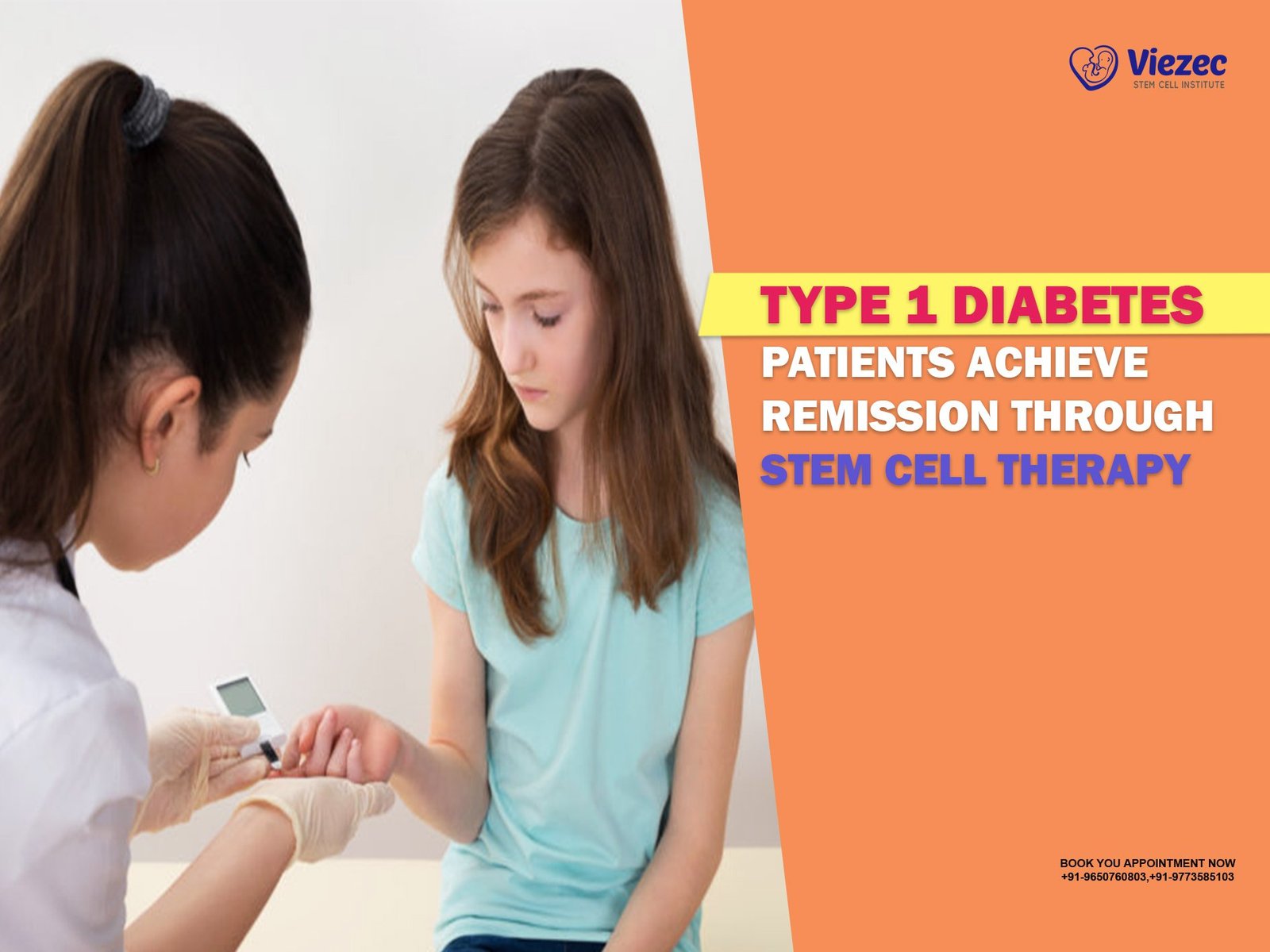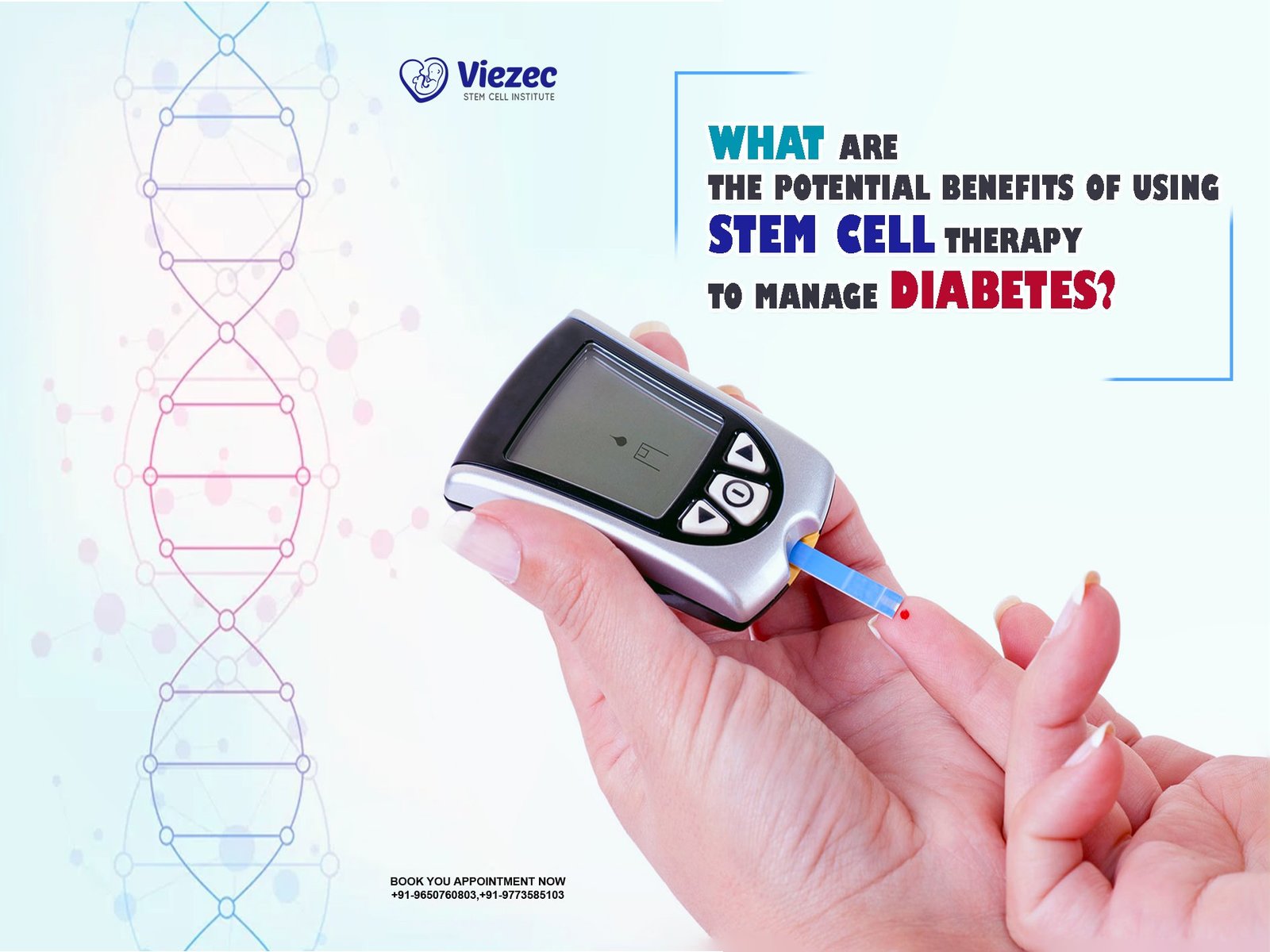Type 1 diabetes is a chronic condition where the pancreas produces little or no insulin due to an autoimmune attack on its insulin-producing beta cells. This disease typically manifests in childhood or adolescence but can develop in adults as well. Unlike Type 2 diabetes, which is often associated with lifestyle factors, Type 1 diabetes is primarily genetic and environmental. Managing this condition requires lifelong insulin therapy and strict monitoring of blood glucose levels to prevent complications such as cardiovascular disease, nerve damage, and kidney failure. Despite advancements in treatment, patients continue to face significant challenges in achieving optimal glucose control and a good quality of life.
Overview of Stem Cell Therapy
Stem cell therapy represents a groundbreaking approach in the medical field, offering potential cures for various conditions by regenerating damaged tissues and organs. This therapy utilizes the unique properties of stem cells, which can differentiate into specialized cell types and possess self-renewal capabilities. For Type 1 diabetes, stem cell therapy aims to replace the destroyed beta cells in the pancreas, restoring the body’s ability to produce insulin naturally. Various types of stem cells, including embryonic, induced pluripotent, and adult stem cells, are being explored for their potential in treating diabetes. Clinical trials and research are ongoing to determine the safety and efficacy of these therapies in achieving long-term remission.
Purpose of the Study
The primary purpose of this study is to explore the potential of stem cell therapy in achieving remission for Type 1 diabetes patients. This involves an in-depth examination of the mechanisms through which stem cells can regenerate beta cells and modulate the immune system. Additionally, the study aims to provide a comprehensive overview of clinical trials, case studies, and patient outcomes related to stem cell therapy. By analyzing the success stories and challenges faced in different regions, particularly in India, the study seeks to highlight the advancements and future prospects of this innovative treatment. Ultimately, this research aspires to contribute to the ongoing efforts to find a cure for Type 1 diabetes.
Understanding Type 1 Diabetes
Definition and Causes
Type 1 diabetes is an autoimmune disorder characterized by the destruction of insulin-producing beta cells in the pancreas. This destruction is mediated by the body’s immune system, which mistakenly targets these cells as foreign. The exact cause of this autoimmune response is not fully understood, but it is believed to involve a combination of genetic predisposition and environmental triggers, such as viral infections. Unlike Type 2 diabetes, which is linked to insulin resistance and often influenced by lifestyle factors, Type 1 diabetes is primarily driven by these genetic and immunological factors. Research continues to investigate the complex interplay of these elements to better understand and prevent the disease.
Symptoms and Diagnosis
The symptoms of Type 1 diabetes can appear suddenly and include increased thirst, frequent urination, extreme hunger, unintended weight loss, fatigue, blurred vision, and irritability. These symptoms result from the body’s inability to utilize glucose properly due to the lack of insulin. Diagnosis typically involves several tests, including fasting blood glucose, hemoglobin A1c, and the presence of autoantibodies that attack beta cells. Early detection is crucial to prevent complications and initiate appropriate treatment. Advances in diagnostic tools and screening methods are improving the early identification and management of this condition, enhancing the quality of life for patients.
Current Treatment Options
Current treatment options for Type 1 diabetes focus on managing blood glucose levels and preventing complications. Insulin therapy is the cornerstone of treatment, available in various forms such as rapid-acting, long-acting, and intermediate-acting insulin. Patients administer insulin through injections or insulin pumps, tailored to their specific needs. Continuous glucose monitoring systems and blood glucose meters are essential tools for daily management. Additionally, lifestyle modifications, including a balanced diet and regular physical activity, play a significant role in maintaining optimal glucose levels. Despite these measures, achieving consistent control remains challenging, highlighting the need for more advanced therapeutic approaches.
Global Prevalence and Impact
Type 1 diabetes affects millions of people worldwide, with significant variations in prevalence across different regions. The disease imposes a substantial burden on healthcare systems and individuals, particularly in low- and middle-income countries where access to insulin and diabetes care may be limited. The global prevalence of Type 1 diabetes is increasing, driven by rising incidence rates and improved survival of affected individuals. This chronic condition not only impacts physical health but also poses psychological and financial challenges for patients and their families. Efforts to improve awareness, education, and access to care are essential to address the growing impact of Type 1 diabetes globally.
Stem Cell Therapy: An Innovative Approach
What are Stem Cells?
Stem cells are unique cells with the ability to develop into various specialized cell types and possess self-renewal capabilities. They play a crucial role in the body’s development and healing processes. There are two primary types of stem cells: embryonic stem cells, which are derived from early-stage embryos and can differentiate into any cell type, and adult stem cells, which are found in specific tissues and are more limited in their differentiation potential. Induced pluripotent stem cells (iPSCs) are adult cells reprogrammed to an embryonic-like state, offering another versatile source for therapeutic applications. These properties make stem cells a promising tool for regenerative medicine.
Types of Stem Cells Used in Therapy
In the context of Type 1 diabetes, various types of stem cells are being explored for their therapeutic potential. Embryonic stem cells can differentiate into insulin-producing beta cells, offering a potential source for cell replacement therapy. Induced pluripotent stem cells provide a similar advantage without the ethical concerns associated with embryonic stem cells. Additionally, adult stem cells, such as mesenchymal stem cells, have shown potential in modulating the immune system and promoting tissue repair. Each type of stem cell presents unique advantages and challenges, and ongoing research aims to identify the most effective and safe options for clinical use in diabetes treatment.
Mechanisms of Action
Stem cell therapy for Type 1 diabetes involves several mechanisms of action aimed at restoring insulin production and regulating the immune response. One key mechanism is the differentiation of stem cells into functional beta cells, which can produce and secrete insulin in response to blood glucose levels. Another important aspect is the modulation of the immune system to prevent further destruction of beta cells. Mesenchymal stem cells, for example, can exert anti-inflammatory effects and promote immune tolerance. Additionally, stem cells may enhance the regeneration of existing beta cells and support the repair of damaged pancreatic tissue, contributing to overall pancreatic function.
Clinical Trials and Research
Early Studies and Findings
Early studies on stem cell therapy for Type 1 diabetes have shown promising results, laying the foundation for more advanced research. Initial experiments demonstrated the potential of stem cells to differentiate into insulin-producing cells and improve glucose regulation in animal models. Clinical trials in humans began with safety and feasibility studies, evaluating the effects of stem cell transplantation on beta cell function and immune modulation. These studies provided valuable insights into the potential benefits and challenges of stem cell therapy, highlighting the need for optimized protocols and rigorous long-term evaluation. The encouraging outcomes from these early trials spurred further research and development in this field.
Recent Advances in Stem Cell Therapy
Recent advances in stem cell therapy have significantly enhanced the prospects of achieving remission in Type 1 diabetes patients. Breakthroughs in cell reprogramming techniques and improved differentiation protocols have led to the generation of more functional and stable insulin-producing cells. Advances in gene editing technologies, such as CRISPR-Cas9, have enabled precise modifications to enhance the therapeutic potential of stem cells. Additionally, innovative delivery methods, such as encapsulation devices, are being developed to protect transplanted cells from immune attack while ensuring their functionality. These advancements are propelling the field towards more effective and sustainable treatments for Type 1 diabetes.
Key Clinical Trials and Outcomes
Several key clinical trials have been conducted to evaluate the efficacy of stem cell therapy in achieving remission for Type 1 diabetes patients. Notable trials include those conducted by ViaCyte, which developed encapsulated beta cell precursors, and Vertex Pharmaceuticals, which focused on stem cell-derived beta cell transplants. These trials have shown promising results, with some patients achieving insulin independence or significantly reduced insulin requirements. Long-term follow-up studies are essential to assess the durability of these outcomes and the safety of the treatments. The positive results from these trials provide hope for a potential cure and pave the way for broader clinical applications.
Case Studies of Remission
Patient Profiles
Case studies of patients who have achieved remission through stem cell therapy provide valuable insights into the treatment’s potential. These patients typically have a history of Type 1 diabetes, characterized by insulin dependence and varying degrees of glycemic control. Detailed profiles include age, duration of diabetes, previous treatment regimens, and baseline clinical parameters. Understanding the diversity of patient profiles helps in identifying factors that influence treatment outcomes and tailoring therapy to individual needs. The experiences of these patients offer hope and guidance for others considering stem cell therapy as a treatment option.
Treatment Protocols
The treatment protocols for stem cell therapy in Type 1 diabetes patients vary depending on the type of stem cells used and the specific therapeutic approach. Common protocols involve the isolation and expansion of stem cells, followed by their differentiation into insulin-producing beta cells. These cells are then transplanted into the patient, often encapsulated to protect them from immune rejection. Immunosuppressive therapy may be used to prevent immune-mediated destruction of the transplanted cells. Monitoring and follow-up care are crucial to assess the efficacy and safety of the treatment, with adjustments made as needed based on patient response and clinical outcomes.
Success Stories
Success stories of patients achieving remission through stem cell therapy highlight the transformative potential of this treatment. These stories often involve patients who have experienced significant improvements in glycemic control, reduced or eliminated insulin requirements, and enhanced quality of life. Personal testimonials emphasize the emotional and psychological benefits of achieving remission, such as reduced anxiety and increased freedom in daily activities. These success stories serve as powerful evidence of the effectiveness of stem cell therapy and inspire further research and development. They also provide hope and encouragement to other patients and their families facing the challenges of Type 1 diabetes.
Stem Cell Therapy in India
Overview of Healthcare in India
India has a diverse and rapidly evolving healthcare system, with a mix of public and private providers offering a wide range of medical services. The country faces significant healthcare challenges, including a high burden of chronic diseases such as diabetes. However, India has made notable strides in medical research and technology, positioning itself as a hub for innovation in healthcare. The government and private sector are actively investing in healthcare infrastructure, research, and education to improve access and quality of care. Stem cell therapy represents a promising area of development, with several institutions and companies leading the way in research and clinical applications.
Stem Cell Research and Development in India
India has emerged as a significant player in stem cell research and development, with numerous institutions and biotech companies conducting cutting-edge research in this field. Indian scientists are exploring various aspects of stem cell therapy, including the development of novel cell lines, differentiation protocols, and innovative delivery methods. Clinical trials are being conducted to evaluate the safety and efficacy of stem cell treatments for various conditions, including Type 1 diabetes. Collaborative efforts with international research organizations and participation in global clinical trials are further enhancing India’s contributions to the advancement of stem cell therapy.
Case Studies from India
Case studies from India highlight the country’s progress in applying stem cell therapy for Type 1 diabetes. These cases involve patients who have undergone stem cell transplantation and achieved significant clinical improvements. Detailed reports on these cases include patient demographics, treatment protocols, and outcomes, providing valuable data for further research and clinical practice. Success stories from India demonstrate the feasibility and potential benefits of stem cell therapy in diverse patient populations. They also underscore the importance of continued investment in research, education, and healthcare infrastructure to support the growth of regenerative medicine in India.
Mechanisms of Remission
Immune System Modulation
One of the critical mechanisms through which stem cell therapy achieves remission in Type 1 diabetes patients is immune system modulation. Type 1 diabetes is characterized by an autoimmune attack on the pancreatic beta cells. Stem cells, particularly mesenchymal stem cells, have immunomodulatory properties that can suppress harmful immune responses and promote immune tolerance. By altering the activity of immune cells, stem cells help protect the newly formed or transplanted beta cells from autoimmune destruction. This modulation is essential for achieving and maintaining long-term remission, as it addresses the underlying cause of the disease.
Beta Cell Regeneration
Beta cell regeneration is another key mechanism by which stem cell therapy can lead to remission in Type 1 diabetes. Stem cells have the ability to differentiate into insulin-producing beta cells, effectively replacing the cells destroyed by the autoimmune process. This regeneration restores the pancreas’s ability to produce and secrete insulin in response to blood glucose levels, helping to normalize glucose metabolism. Research is ongoing to optimize the protocols for beta cell differentiation and to ensure the functionality and stability of these cells after transplantation. Successful beta cell regeneration is crucial for the sustained efficacy of stem cell therapy.
Long-term Efficacy and Maintenance
The long-term efficacy and maintenance of remission achieved through stem cell therapy depend on several factors, including the durability of the regenerated beta cells and the continued modulation of the immune system. Monitoring and follow-up care are essential to assess the long-term outcomes and address any potential complications. Strategies such as booster doses of stem cells or adjunct therapies may be employed to enhance and sustain the therapeutic effects. Ongoing research aims to understand the factors influencing long-term efficacy and to develop protocols that ensure the maintenance of remission over time, offering patients a durable and lasting solution to Type 1 diabetes.
Comparative Analysis
Stem Cell Therapy vs. Traditional Treatments
Stem cell therapy offers several advantages over traditional treatments for Type 1 diabetes. Unlike insulin therapy, which requires lifelong management and frequent monitoring, stem cell therapy aims to restore the body’s ability to produce insulin naturally, potentially reducing or eliminating the need for external insulin. This approach addresses the root cause of the disease rather than just managing the symptoms. However, stem cell therapy is still in the experimental stages and may not be suitable for all patients. A comparative analysis highlights the potential benefits and limitations of both treatment modalities, helping patients and healthcare providers make informed decisions.
Regional Differences in Treatment Efficacy
The efficacy of stem cell therapy for Type 1 diabetes may vary across different regions due to factors such as genetic diversity, healthcare infrastructure, and access to advanced medical technologies. Studies have shown that patient outcomes can differ based on these regional factors, influencing the overall success of the treatment. Understanding these differences is crucial for optimizing treatment protocols and ensuring equitable access to effective therapies. Collaborative international research and data sharing can help address these disparities and improve the global efficacy of stem cell therapy for Type 1 diabetes.
Long-term Outcomes
Long-term outcomes of stem cell therapy for Type 1 diabetes are still being evaluated, with ongoing studies monitoring patients for several years post-treatment. Early results are promising, showing sustained improvements in glycemic control and insulin independence in some patients. However, long-term follow-up is essential to assess the durability of these outcomes and to identify any late-onset complications or challenges. Comprehensive data on long-term outcomes will provide valuable insights into the potential of stem cell therapy as a viable cure for Type 1 diabetes and guide future research and clinical practice.
Patient Perspectives
Quality of Life Improvements
Patients who have undergone stem cell therapy for Type 1 diabetes often report significant improvements in their quality of life. Achieving remission or reduced insulin dependence allows for greater freedom in daily activities and reduces the burden of constant glucose monitoring and insulin administration. Improved glycemic control can also lead to better overall health and a lower risk of diabetes-related complications. Patient testimonials highlight the transformative impact of stem cell therapy, not only on physical health but also on emotional and psychological well-being. These quality of life improvements underscore the importance of advancing this promising treatment.
Patient Testimonials
Patient testimonials provide powerful, firsthand accounts of the impact of stem cell therapy on their lives. These stories often emphasize the relief and hope that come with achieving remission or significant reductions in insulin requirements. Patients describe their experiences with the treatment process, the challenges they faced, and the improvements they observed in their health and daily life. These testimonials serve as an inspiration for other patients and highlight the potential of stem cell therapy to transform lives. They also provide valuable insights for researchers and clinicians working to refine and expand this innovative treatment.
Support Networks and Resources
Support networks and resources play a crucial role in helping Type 1 diabetes patients navigate their treatment journey, including those considering or undergoing stem cell therapy. Online forums, patient advocacy groups, and healthcare organizations offer valuable information, emotional support, and practical advice. These resources connect patients with others who share similar experiences, fostering a sense of community and mutual support. Access to reliable information and professional guidance helps patients make informed decisions and manage their condition more effectively. Building strong support networks is essential for enhancing the overall experience and outcomes for patients undergoing stem cell therapy.
FAQs
What is stem cell therapy for Type 1 diabetes?
Stem cell therapy for Type 1 diabetes involves using stem cells to regenerate insulin-producing beta cells in the pancreas and modulate the immune system to prevent further destruction of these cells. The goal is to restore the body’s ability to produce insulin naturally, reducing or eliminating the need for external insulin.
How does stem cell therapy differ from traditional insulin therapy?
Unlike traditional insulin therapy, which requires lifelong management and frequent monitoring, stem cell therapy aims to address the root cause of Type 1 diabetes by regenerating beta cells and modulating the immune system. This approach has the potential to achieve long-term remission and reduce or eliminate the need for external insulin.
What are the potential risks and challenges of stem cell therapy for Type 1 diabetes?
Potential risks and challenges of stem cell therapy include immune rejection of transplanted cells, incomplete or unstable differentiation of stem cells into functional beta cells, and long-term safety concerns. Ongoing research and clinical trials are working to address these challenges and optimize treatment protocols.
Where can I find more information and support for stem cell therapy for Type 1 diabetes?
For more information and support, patients can visit reputable healthcare organizations, patient advocacy groups, and online forums dedicated to Type 1 diabetes and stem cell therapy. These resources provide valuable information, emotional support, and practical advice for patients considering or undergoing this treatment.











